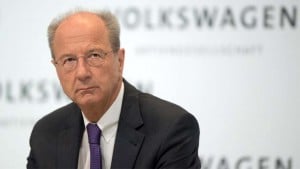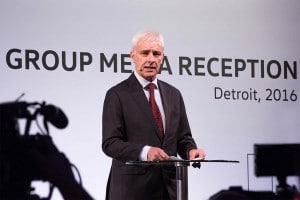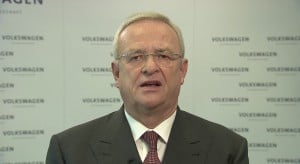
Former VW Chairman Hans Dieter Poetisch denied having knowledge of the scope of the diesel cheating scandal
Some former top Volkswagen AG executives are breathing easier after German prosecutors agreed to end dieselgate-related investigations in exchange for paying fines.
Former Chairman Hans Dieter Poetsch and former VW Chief Executive Matthias Mueller are no longer being subjected to a probe after Porsche Automobil Holding SE agreed to pay a 1.5 million-euro, or $1.8 million, fine.
The two were being investigated for failing to warn investors about the growing fallout of VW’s diesel emissions scandal in 2015. An investigation into former CEO Martin Winterkorn will continue.
(VW denies Chairman Poetsch knew about scandal early.)
The move follows a similar move by prosecutors in May when they dropped charges against Poetsch and the company’s current chief Herbert Diess after the company agreed to a fine of 9 million euros, about $10 million.
In addition to their roles at Volkswagen, both Poetsch and Mueller were members of the board of Porsche Automobil Holding SE, the family-owned company which has 53.3% voting stake in Volkswagen AG.
Poetsch has long maintained that he was unaware of the cheating device used by VW engineers to skirt emissions testing until just before the brewing scandal was revealed by U.S. authorities in September 2015. This is in spite of media reports that he knew as early as June 2015.
(German automakers enduring more diesel-related scrutiny.)
German newspaper Bild am Sonntag claimed in 2018 that claims that Poetsche reviewed a presentation dubbed “Sacramento” dated June 24, 2015, which said the company was violating U.S. emissions rules and the company may also have breached its supervisory obligations. He and the company denied the claims.
Diess, who’s come under fire lately for other issues, had just joined the company a few months before the scandal broke. The issue forced then VW CEO Winterkorn to resign from the company.
The scandal ultimately forced several of the company’s top executives to leave the company, and it has cost the parent company more than $35 billion in fines, penalties and fees in the U.S., Germany and several other companies.
(Investors sue VW AG for $10.4 billion.)
However, it essentially acted as a catalyst for the German automakers massive push into electric vehicle development. That move now sees the parent company’s brands rolling out more than 40 electric vehicles in the next few years.


